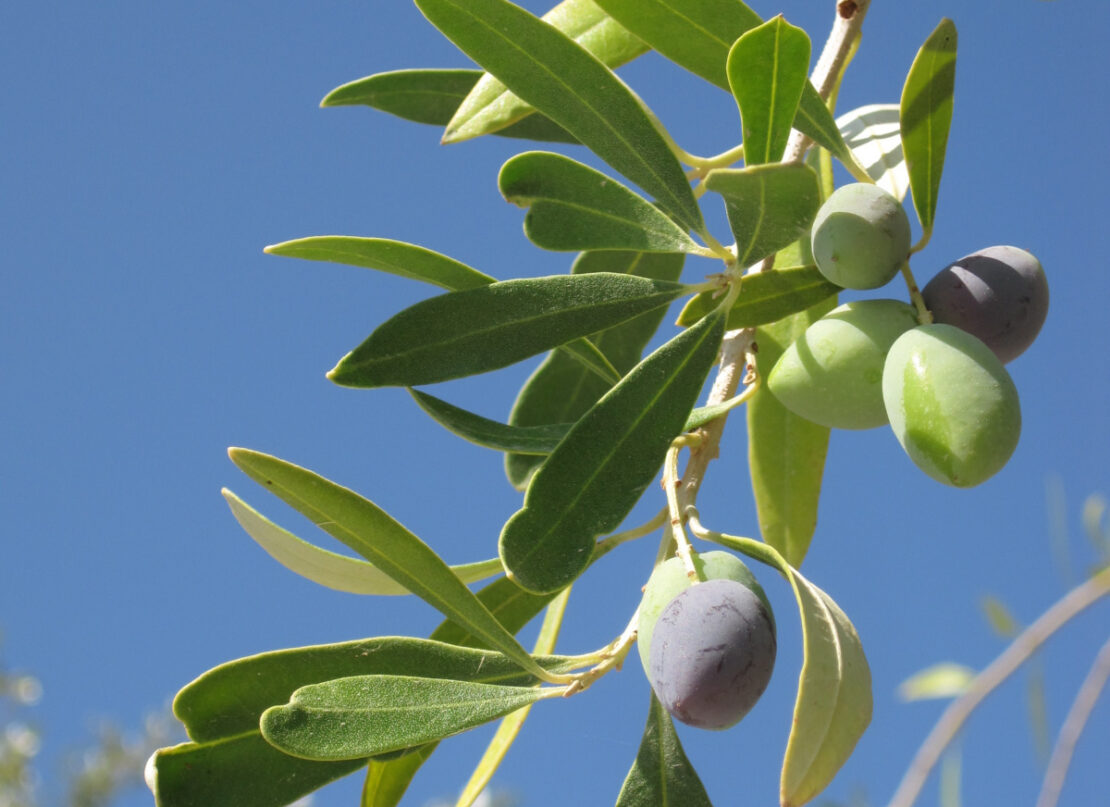
Greek Olive Oil Traditions + How to Do an Olive Oil Tasting and Identify the Best Variety
Olive oil has a rich and magical history in Greece, where the landscape is dotted with millions of majestic olive trees. Derived from the pressing of ripe olives picked from the Olea europaea tree, this supreme food has been used for thousands of years in the Mediterranean region, Asia, and Africa. The magic of Greek olive oil stems from a combination of rich cultural traditions, as well as its benefits and usages in both cuisine and herbalism.
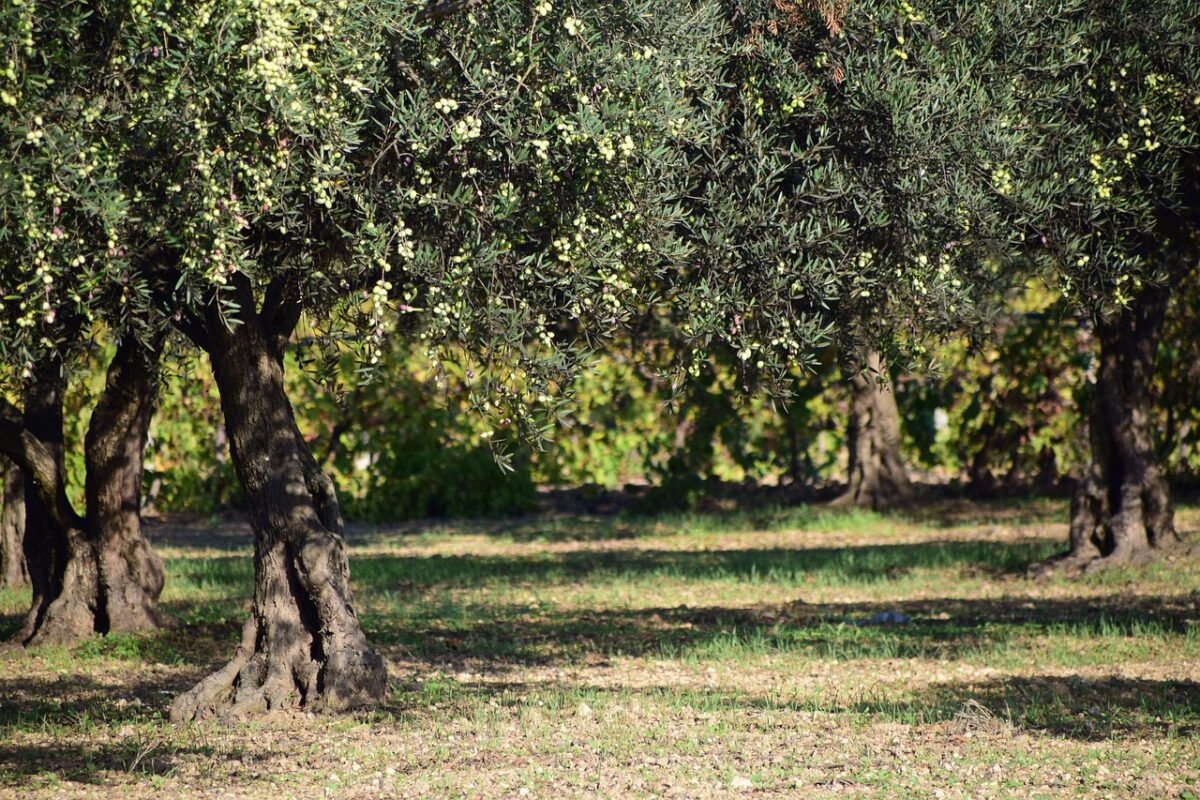
Traditions in Greece
The olive tree is an evergreen and thrives in hot and dry climates. The tree has a unique gnarled and twisted trunk and does not typically grow taller than 50 feet. Impressively, the olive tree can live to be thousands of years old, and even in its old age can produce olives. One of the oldest olive trees in Greece, and possibly the world, is the olive tree of Vouves, located on the island of Crete and estimated to be between 2,000-4,000 years old (Rackham & Moody, 1996). In 1997, the tree was declared a protected natural monument, and an olive museum was built nearby.
The Greek landscape, with its arid and sunny climate, offers prime conditions for the success of the olive tree. Olive groves throughout Greece are often passed down to each generation as part of family inheritances. With each generation, the tree continues its legacy of providing a supreme source of nutrition, financial stability, and a connection to the historically rich land.
The history of olive trees stretches as far back as 7,000 years ago. In ancient Greece, the olive tree was associated with Athena, goddess of wisdom, courage, and strength. In a gift-giving competition against Poseidon, god of the seas, Athena won by sprouting the very first olive tree on the Acropolis (an olive tree still marks the spot there). As a result of her victory, she received the highest honor of becoming the patron goddess of Athens, the city bearing her name. Subsequently, the olive tree became a symbol of peace, prosperity, and wisdom.
In antiquity, as in modern times, olive oil has been a prominent feature of the Greek identity. It has been called “liquid gold” and “the great healer” for its versatile uses in cuisine, wellness, and body care (Clodoveo et al., 2014). Ancient physicians, including Hippocrates, Theophrastus, and Dioscorides, extolled its many benefits, including for digestive issues, oral care, skin conditions, and in dealing with sports injuries in combination with massage (Nomikos et al., 2010). Olive oil rubbed daily on the head was said to even discourage premature grey hair (Dioscorides et al., 2000, p. 35).
During ancient athletic competitions, athletes would coat their bodies with olive oil in hopes of infusing themselves with the strength of the goddess Athena. Winners of the Olympic games would receive large jugs of olive oil from sacred groves as their prizes, as well as victory crowns made of olive branches. Cosmetically, olive oil was the carrier oil for perfumes made with aromatic herbs, and archaeological evidence of small clay perfume bottles demonstrates its widespread use. In sacred settings, the oil was used as fuel for the holy lamps in temples and to anoint kings and victors. In modern religious rituals in the Greek Orthodox Christian Church, olive oil is used during baptisms and major holidays as the means for anointment.
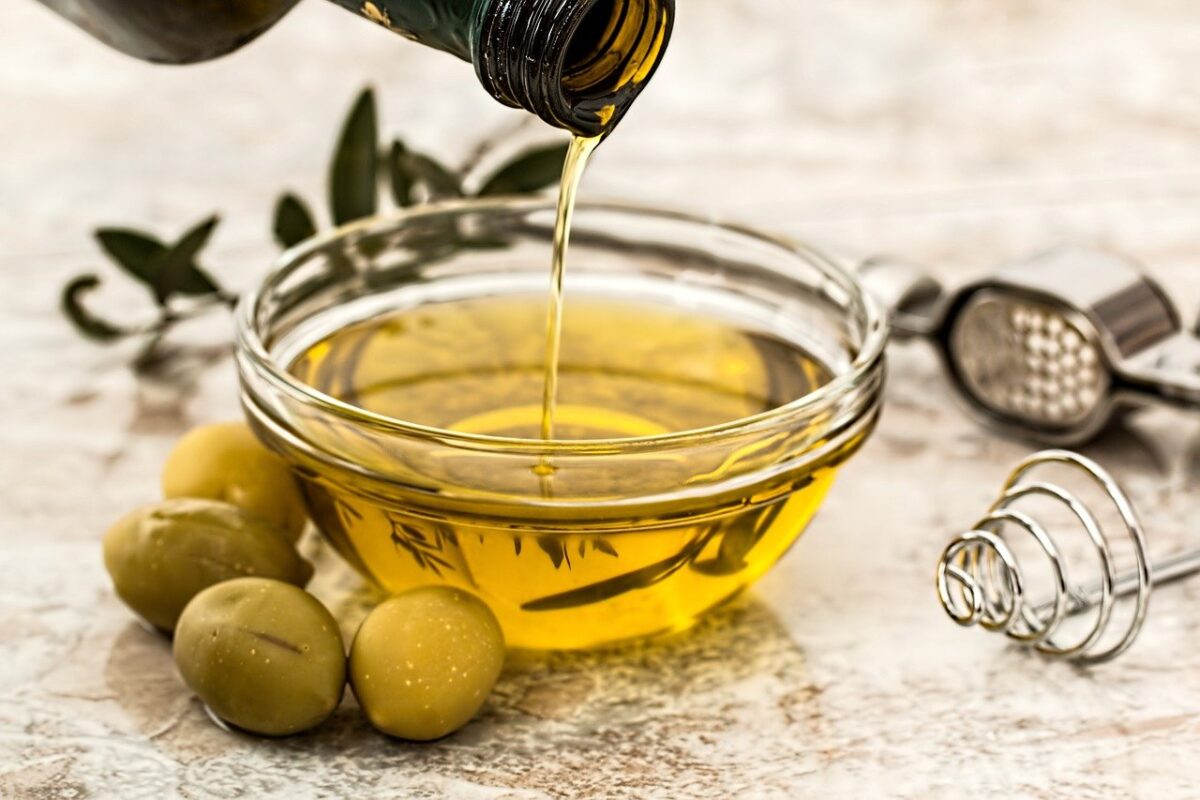
Olive Oil in Culinary Traditions
In the culinary setting, olive oil is a staple of the Mediterranean diet. On average, Greeks consume more than 10 liters of oil per year. This oil is considered a superfood and is generously poured over salads and vegetables and used in cooking.
While olive oil is ubiquitous in Greek culture, the process of making it requires hard labor, special equipment, and annual dedication. Throughout the Greek countryside between November and March, olives are harvested by hand, either using hand-held rods to shake the branches loose of their olives or mechanical shakers. The olives fall to the ground on a cloth that generously covers the ground below the tree and are gathered into heavy sacks.
On the very same day, the olives are brought to an olive press; the traditional method used granite wheels to press the olives, while modern presses are made from stainless steel. At the olive press, the olives are separated from their leaves, washed, and crushed to a pulp in a large mixer. Through centrifugal separation, the olive oil is extracted. For large productions, the oil is stored in stainless steel tanks at bottling facilities. After the oil has settled, usually for at least one month, the oil is processed through mechanical filtration to ensure its integrity. During pressing and storage, the temperature is always kept below 16 degrees Celsius to prevent a decline in quality. The final step is bottling and labeling it.
Today, there are approximately 140 million olive trees in Greece. The harvested olives produce approximately 300 million liters of olive oil annually, of which 190 million are exported, making Greece the world’s third biggest producer (Tagaris, 2021). Most of the olive oil produced in Greece (82%) is extra virgin olive oil (EVOO), which is the highest-ranking grade. Ninety percent of the olive oil produced on the island of Crete is EVOO. In recent years, Greek olive oil production has unfortunately declined due to higher temperatures and drastic weather shifts caused by climate change (Tagaris, 2021).
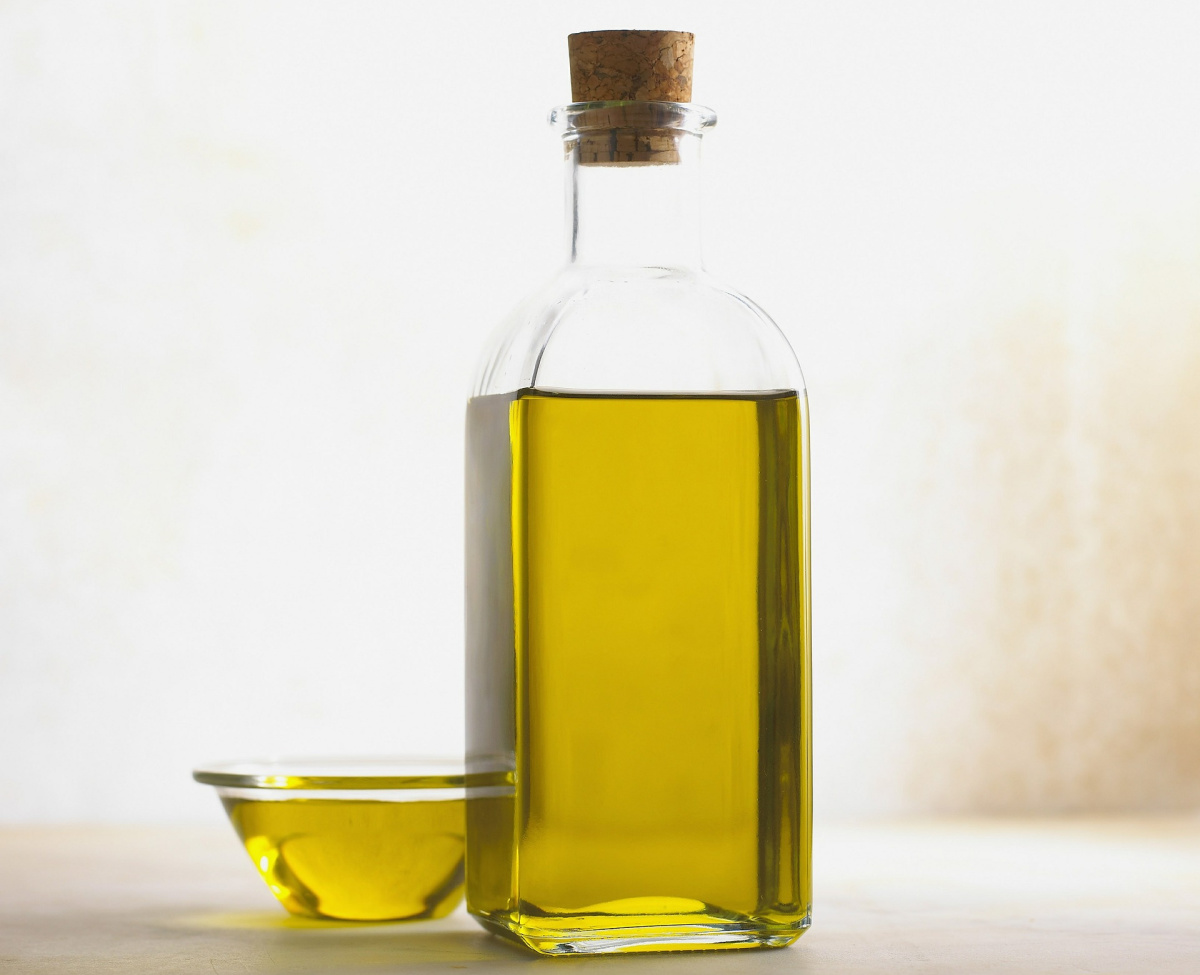
Oil Tasting in Greece
One of the best ways to understand olive oil is to experience an olive oil tasting, an activity that is offered throughout Greece. This is a sensory, organoleptic experience that involves smelling and tasting a small amount of olive oil. Here’s how to do an olive oil tasting.
- Start with a small amount of olive oil in a tasting cup, held in the palm of one hand, with the other hand over the top of the glass to seal it. For 10 seconds, gently swoosh the oil inside to warm it up.
- Hold the cup at heart level and remove the top hand. Take a breath for an immediate first impression and then a deeper breath to identify the intensity of the aroma. Refer to a flavor wheel for olive oil tasting to help you identify what you smelled. As an example, take a look at this flavor wheel created by Zurich University of Applied Sciences.
- Slowly take a small sip and roll it around your mouth so it coats the tongue well. With clenched teeth, draw in two or three breaths of air into your mouth. This is called aspiration and allows the oil to be sprayed into the back of the throat. Note the presence, intensity, and balance of the three elements of the oil and their degrees: fruitiness, bitterness, and pungency. Fresh EVOO tends to have a peppery flavor. Refer to an olive oil aroma & characteristics chart to help you identify what you tasted.
- Either swallow the oil or spit it out in a separate cup. Between each olive oil sample, it is necessary to cleanse your palate with a slice of green apple and a sip of water.
During an olive oil tasting, there may be several olive oils offered. There are six main varieties of olive oil in Greece, loosely based on region:
Makri is a dense and sweet variety that is cultivated in northern Greece.
Fruitiness intensity: medium
Bitterness & Pungency intensity: medium pungent-bitter
Aromas: flowers, herbs, almonds
Manaki is a mild and sweet variety cultivated in the Peloponnese and central Greece.
Fruitiness intensity: light to medium
Bitterness & Pungency intensity: light pungent-bitter
Aromas: red apple, citrus, tomato
Megaritiki (Megaron) is a mild and sweet variety cultivated in central Greece.
Fruitiness intensity: medium
Bitterness & Pungency intensity: medium pungent-bitter
Aromas: almonds, red fruits, flowers
Athinoelia (Tsounati) is markedly high in antioxidants and is cultivated in Crete and in high altitudes in the Peloponnese.
Fruitiness intensity: medium to robust
Bitterness & Pungency intensity: medium pungent-bitter
Aromas: herbal and floral notes, tomato leaf, artichoke, green apple, avocado
Koroneiki is considered the king variety, as it is most predominant. It is cultivated in Crete and the Peloponnese.
Fruitiness intensity: medium to robust
Bitterness & Pungency intensity: medium pungency greater than bitter tones
Aromas: fresh cut grass, tomato leaf, artichoke, green apple, almond
Kolovi is a complex variety cultivated on Lesvos and Chios.
Fruitiness intensity: medium to robust
Bitterness & Pungency intensity: medium to robust
Aromas: fresh cut grass, green tea, tomato, green pepper
The main terms used to describe olive oil are defined here:
Fruitiness refers to the aroma and taste of the oil. It should be fresh and have an underlying fruity olive tone.
Bitterness refers to the polyphenols present in the olive oil. Generally, high amounts of polyphenols create high bitterness and pungency flavors. Polyphenols are an indicator of antioxidants that are vital for cardiovascular health. High levels of polyphenols also improve the shelf life of EVOOs.
Pungency is also derived from polyphenols. It is considered more of a sensation than a taste. More pungent oils generally contain higher levels of polyphenols. Pungency can be regarded as astringent and can have a peppery or similar definition.
When olive oil is not made well or is stored improperly, it can become rancid, fusty, musty, or muddy. These terms are defined as:
- Rancid – having an unpleasant smell or taste.
- Fusty – having a stale smell caused by fermentation in the absence of oxygen; this occurs when olives are not pressed into oil as soon as they are harvested (i.e. they sat in their sacks or on piles for too long before being pressed).
- Musty – having an odor or flavor suggestive of mold, caused by moldy olives.
- Muddy – cloudy with sediment.
Rancidity and fustiness are the two most common problems with olive oil (Devarenne, 2010). Before consuming or making an herbal preparation, be sure to taste the oil to ensure its quality and flavor. Always be conscientious about the olive oil you choose!
Understanding the different kinds of olive oil can help with flavoring culinary dishes or making an herbal preparation. Each oil offers a different experience that is worthy of exploration. Most importantly, choosing EVOO and avoiding refined olive oils can help ensure the highest quality and most effective benefits for the body. Let’s explore these amazing benefits.
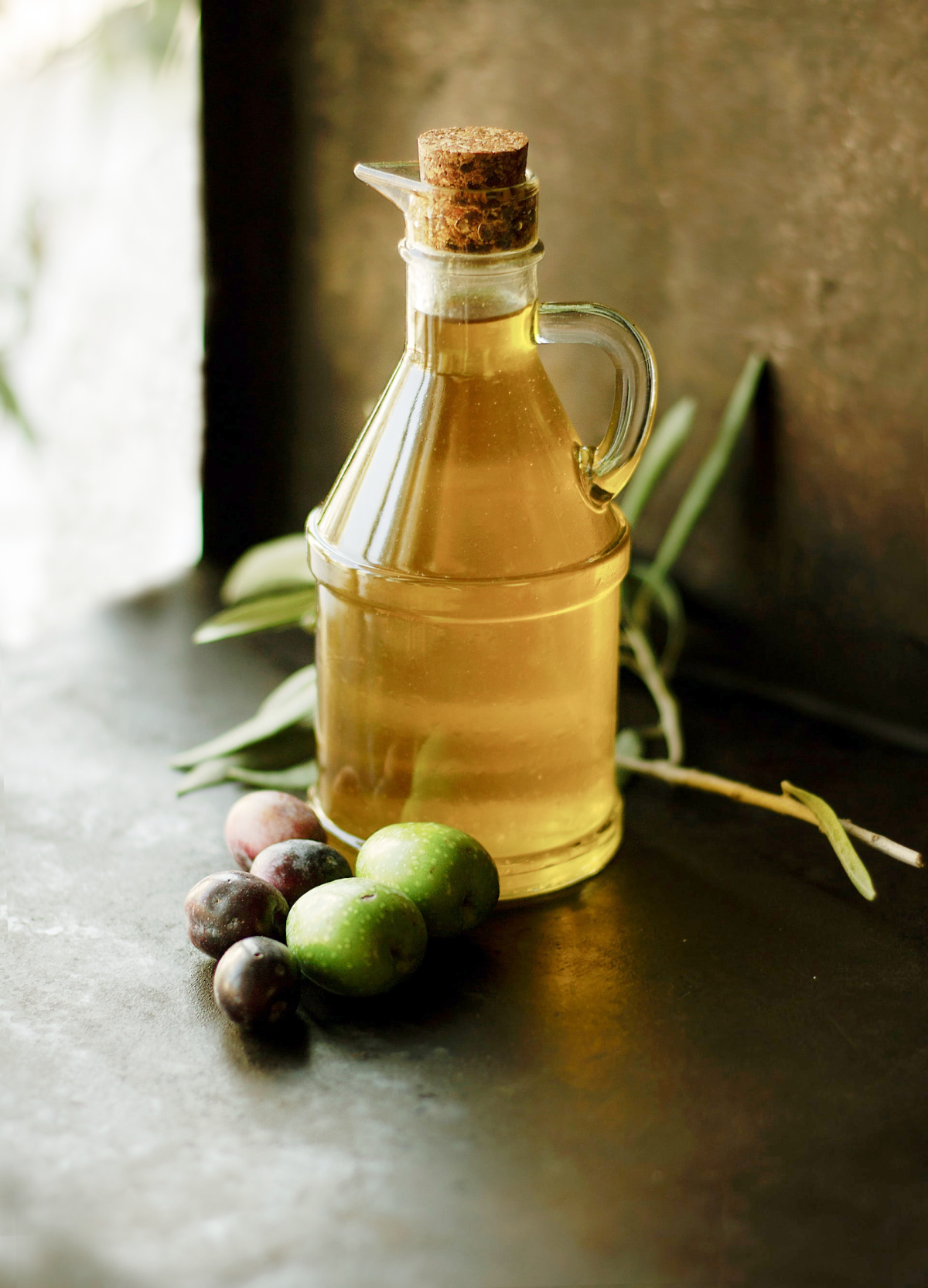
Nurturing Benefits of Olive Oil
Extensive scientific research on olive oil has demonstrated many amazing health benefits. Polyphenols are shown to support wellness in the face of cardiovascular, neurodegenerative, and cancer diseases. The beneficial action of polyphenols as antioxidants helps eliminate free radicals in the body that cause detrimental inflammation (Gorzynik-Debicka, et al., 2018). There are several types of polyphenols, most notably oleuropein, which has been proven to have anti-atherogenic (discouraging formation of fatty deposits in the arteries), anti-inflammatory, anti-angiogenic (discouraging tumors from growing their own blood vessels), and anticancer properties (Gorzynik-Debicka, et al., 2018). EVOO contains the highest levels of polyphenols (approximately 500 mg/Kg), whereas common olive oil (typically a blend of several olive oils) and refined olive oil contain approximately 0-100 mg/Kg (Gorzynik-Debicka, et al., 2018). Additionally, olive oil has been studied for its ability to support the healthy function of the heart by lowering blood pressure and improving the function of blood vessels with promising results (Moreno-Luna, et al., 2012).
Olive oil also contains high levels of monounsaturated fatty acids, particularly oleic acid, which help maintain healthy cholesterol levels and lower LDL cholesterol (Parthasarathy, et al., 1990). Oleic acid is a type of omega-9 fatty acid that has been studied for its potential to reduce the risk of diabetes and support healthy insulin levels (Gavahian, 2019; Jurado-Ruiz, et al., 2019). This oil has also been studied for its ability to support a healthy gut microbiome and to improve the immune response in eliminating various pathogens, including bacteria, viruses, and fungi (Gavahian, 2019). Topically, olive oil has emollient and moisturizing properties that can benefit the skin and support healthy cell regeneration.
When using olive oil for its benefits or herbal purposes, there are multiple factors to consider:
- It is a perishable product and needs to be stored in a dark, cool place. It is best consumed within 2 months of opening the bottle, but its shelf life is no more than 2 years from bottling.
- Ensure what you purchase is new. Check the made-on date and the expiration date listed on the packaging. More importantly, check the ingredients and avoid oil that contains a blend of oils from various sources.
- Choose an oil of the highest quality that is accessible to you. EVOO and virgin olive oil provide the most benefits and value.
In Closing,
Olive oil is a golden reflection of the land and the wisdom embodied in the long-living olive tree. It is a testament to the strength and dedication of people, who for thousands of years have cared for the trees and harvested their fruits. The magic of Greek olive oil lies in the sun-kissed land and long-lasting ideals of peace and prosperity that the goddess Athena is believed to have first bestowed upon them. The pronounced benefits of this high-quality oil are wide-ranging and have lasting effects on the body. In combination with herbal practices, this liquid gold can support the body in so many ways.
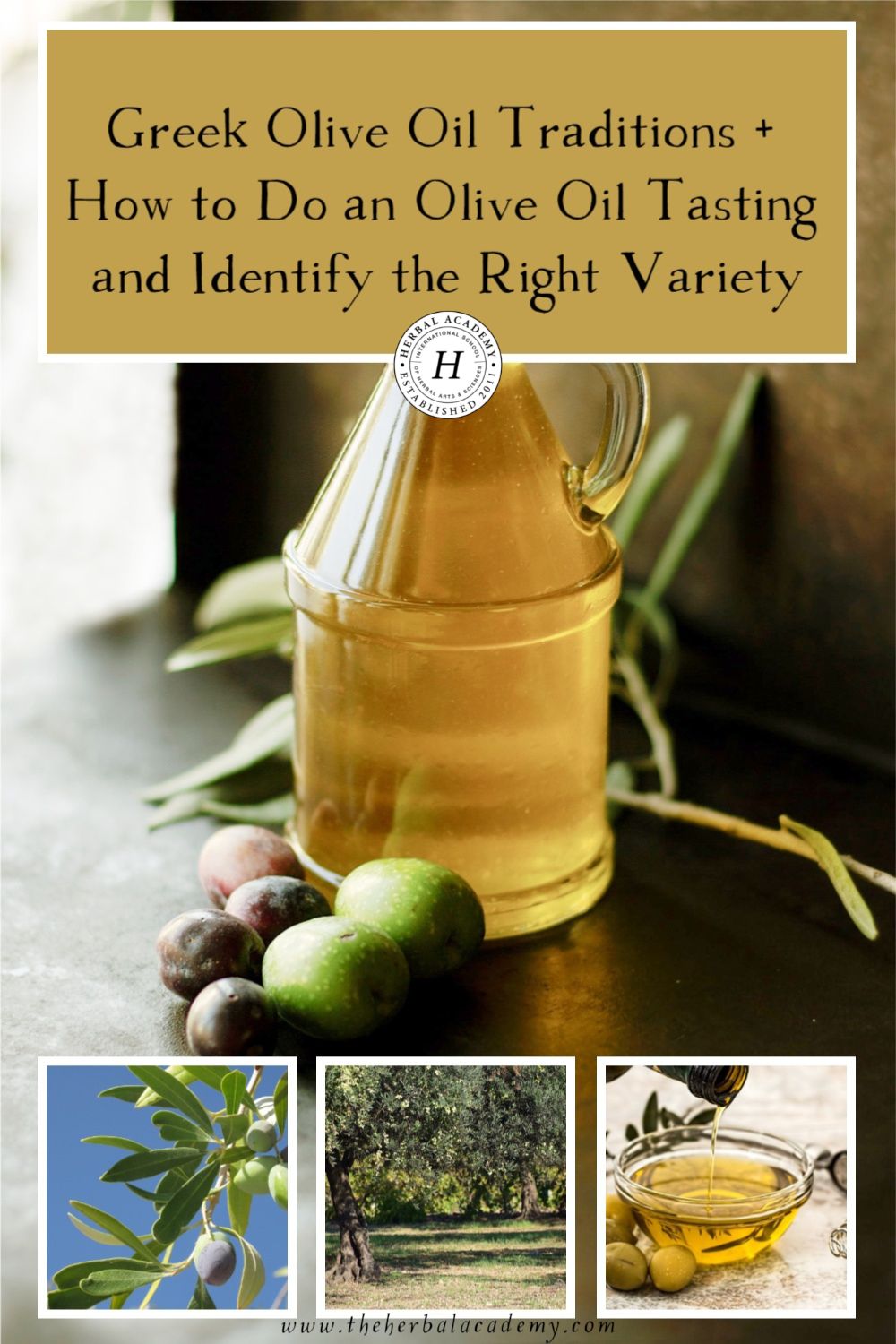
REFERENCES
Clodoveo, M., Camposeo, S., De Gennaro, B., Pascuzzi, S., & Roselli, L. (2014). In the ancient world, virgin olive oil was called “liquid gold” by Homer and “the great healer” by Hippocrates. Why has this mythic image been forgotten? Food Research International, 62, 1062-1068. https://doi.org/10.1016/j.foodres.2014.05.034
Devarenne, A. K. (2010, November 15). Good oils gone bad: Recognizing olive oil defects. Olive Oil Times. https://www.oliveoiltimes.com/world/good-olive-oils-gone-bad/8900
Dioscorides, P., Osbaldeston, T. A., & Wood, R. P. (2000). De materia medica: Being an herbal with many other medicinal materials: Written in Greek in the first century of the common era: A new indexed version in modern English. IBIDIS.
Gavahian, M., Khaneghah, A., Lorenzo, J., Munekata, P., Garcia-Muntrana, I., Collado, M., … Barba, F. (2019). Health benefits of olive oil and its components: Impacts on gut microbiota antioxidant activities, and prevention of noncommunicable diseases. Trends in Food Science & Technology, 88, 220-227. https://doi.org/10.1016/j.tifs.2019.03.008
Gorzynik-Debicka, M., Przychodzen, P., Cappello, F., Kuban-Jankowska, A., Marino, A., Knap, N., … Gorska-Ponikowska, M. (2018). Potential health benefits of olive oil and plant polyphenols. International Journal of Molecular Sciences. 19(3), 686. https://doi.org/10.3390/ijms19030686
Jurado-Ruiz, E., Álvarez-Amor, L., Varela, L., Berná, G., Parra-Camacho, M., Oliveras-Lopez, M., Martínez-Force, E., Rojas, A., Hmadcha, A., Soria, B., & Martín, F. (2019). Extra virgin olive oil diet intervention improves insulin resistance and islet performance in diet-induced diabetes in mice. Scientific Reports, 9(1), 11311. doi: 10.1038/s41598-019-47904-z
Moreno-Luna, R., Muñoz-Hernandez, R., Miranda, M., Costa, A., Jimenez-Jimenez, L., Vallejo-Vaz, A., Muriana, F., Villar, J., & Stiefel, P. (2012). Olive oil polyphenols decrease blood pressure and improve endothelial function in young women with mild hypertension. American Journal of Hypertension, 25(12), 1299-1304. https://doi.org/10.1038/ajh.2012.128
Nomikos, N., Nomikos, G., & Kores, D. (2010). The use of deep friction massage with olive oil as a means of prevention and treatment of sports injuries in ancient times. Archives of Medical Science, 6(5), 642-5. doi: 10.5114/aoms.2010.17074.
Parthasarathy, S., Khoo, J., Miller, E., Barnett, J., Witztum, J., & Steinberg, D. (1990). Low density lipoprotein rich in oleic acid is protected against oxidative modification: implications for dietary prevention of atherosclerosis. Proceedings of the National Academy of Sciences, 87(10), 3894-8. doi: 10.1073/pnas.87.10.3894
Rackham, O. & Moody, J. (1996). The making of the Cretan landscape. Manchester University Press.
Tagaris, K. (2021, December 15). Warming temperatures threaten Greece’s prized olive oil. Reuters. https://www.reuters.com/markets/commodities/warming-temperatures-threaten-greeces-prized-olive-oil-2021-12-15/









